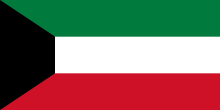Portal:Kuwait
The Kuwait Portal Kuwait, officially the State of Kuwait, is a country in West Asia. It is situated in the northern edge of Eastern Arabia at the tip of the Persian Gulf, bordering Iraq to the north and Saudi Arabia to the south. Kuwait also shares maritime borders with Iran. Kuwait has a coastal length of approximately 500 km (311 mi). Most of the country's population reside in the urban agglomeration of the capital and largest city Kuwait City. , Kuwait has a population of 4.82 million people of which 1.53 million are Kuwaiti citizens while the remaining 3.29 million are foreign nationals from over 100 countries. Historically, most of present-day Kuwait was part of ancient Mesopotamia. Before the discovery of oil, Kuwait was a regional trade port. Oil reserves were discovered in commercial quantities in 1938. In 1946, crude oil was exported for the first time. From 1946 to 1982, the country underwent large-scale modernization, largely based on income from oil production. In the 1980s, Kuwait experienced a period of geopolitical instability and an economic crisis following the stock market crash. In 1990, Kuwait was invaded and subsequently annexed by Iraq under the leadership of Saddam Hussein following disputes over oil production. The Iraqi occupation of Kuwait ended on 26 February 1991, following military intervention by a coalition led by the United States and several other nations. Like some of the other Arab states in the Persian Gulf, Kuwait is an emirate. The emir is the head of state and the Al Sabah is the ruling family which dominates the country's political system. Kuwait's official state religion is Islam, specifically the Maliki school of Sunni Islam. Kuwait is a high-income economy, backed by the world's sixth largest oil reserves. Kuwaiti popular culture, in the form of theatre, radio, music, and television soap opera, is exported to neighboring GCC states. Kuwait is a founding member of the GCC and is also a member of the UN, AL, OPEC and the OIC. (Full article...) Selected article - The Gulf War was an armed conflict between Iraq and a 42-country coalition led by the United States. The coalition's efforts against Iraq were carried out in two key phases: Operation Desert Shield, which marked the military buildup from August 1990 to January 1991; and Operation Desert Storm, which began with the aerial bombing campaign against Iraq on 17 January 1991 and came to a close with the American-led liberation of Kuwait on 28 February 1991. On 2 August 1990, Iraq, governed by President Saddam Hussein, invaded neighboring Kuwait and fully occupied the country within two days. The invasion was primarily over disputes regarding Kuwait's alleged slant drilling in Iraq's Rumaila oil field, as well as to cancel Iraq's large debt to Kuwait from the recently ended Iran-Iraq War. After briefly occupying a rump puppet government, known as the "Republic of Kuwait", Kuwait's sovereign territory was split into the "Saddamiyat al-Mitla' District" in the north, which was absorbed into Iraq's existing Basra Governorate, and the "Kuwait Governorate" in the south, which became Iraq's 19th governorate. The invasion of Kuwait was immediately met with international condemnation, including UN Security Council Resolution 660, which demanded Iraq's immediate withdrawal from Kuwait, and the imposition of comprehensive international sanctions against Iraq with the adoption of UN Security Council Resolution 661. British prime minister Margaret Thatcher and American president George H. W. Bush deployed troops and equipment into Saudi Arabia and urged other countries to send their own forces. An array of countries joined the American-led coalition, forming the largest military alliance since World War II. The bulk of the coalition's military power was from the United States, with Saudi Arabia, the United Kingdom, and Egypt as the largest lead-up contributors, in that order. Additionally, Saudi Arabia and the Kuwaiti government-in-exile paid out around US$32 billion of the US$60 billion cost to mobilize the coalition against Iraq. (Full article...)Did you know...
Related portalsReligions in Kuwait MENA states TopicsWikiProjectsAssociated WikimediaThe following Wikimedia Foundation sister projects provide more on this subject:
Discover Wikipedia using portals |








































